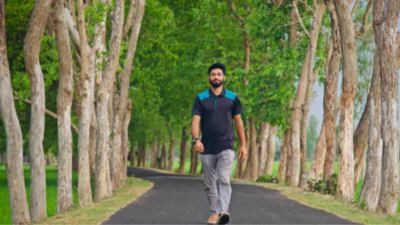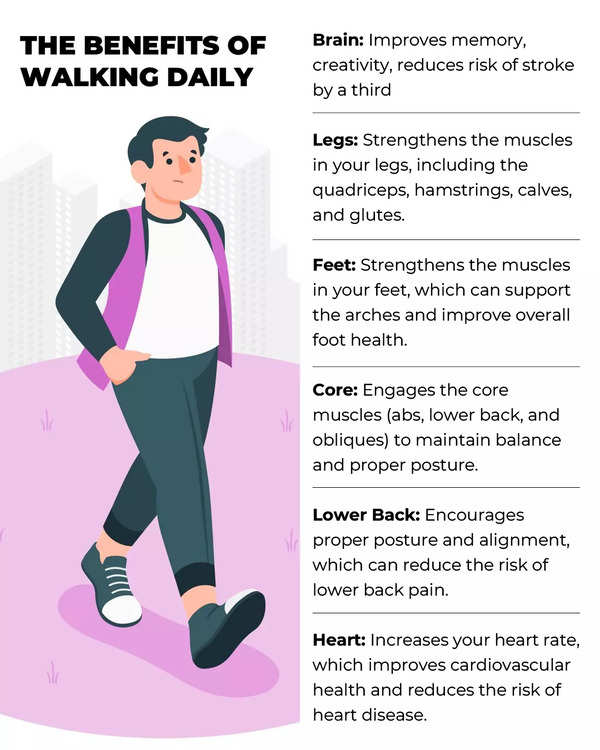- News
- lifestyle
- health-fitness
- fitness
- Time vs steps: What's more effective while walking?
Trending
Time vs steps: What's more effective while walking?
Walking is a simple, accessible exercise beneficial for cardiovascular fitness and mental well-being. The article examines whether focusing on steps or time spent walking is more effective, considering individual fitness goals. It also includes research findings to guide readers in choosing the best approach for their health and fitness needs.

Walking should be an integral part of your daily routine because it's one of the simplest and most accessible forms of exercise. Incorporating walking into your day can enhance cardiovascular fitness, boost mental well-being, and improve overall energy levels, all while being gentle on the joints. Unlike more intense workouts, walking is low-impact and adaptable, making it suitable for people of all ages and fitness levels.
However, when it comes to walking for fitness, the debate often boils down to two key parameters or metrics: time and steps. Each approach has its own set of benefits and can be effective depending on individual fitness goals and preferences. But what does the research say, and how do these metrics impact your overall health and fitness?

Counting steps matter while walking
Step counting has gained popularity largely due to the ubiquitous pedometers and fitness trackers that count every step we take. This method provides a straightforward way to monitor physical activity. The commonly recommended goal of 10,000 steps per day, originating from a marketing campaign in Japan, has become a benchmark for daily activity. This figure is roughly equivalent to about 8 kilometres of walking and represents a level of activity associated with various health benefits, including improved cardiovascular health, better mood, and lower risk of chronic diseases.
Counting steps is advantageous because it offers a clear, quantifiable target. For many, having a daily step goal can be motivating and encourage more consistent activity. It also aligns well with the principle that all movement counts, whether it's taking the stairs, walking to the store, or enjoying a leisurely stroll. Step counting provides an easy way to track progress over time, adjust goals, and stay committed to a fitness routine.
A team of researchers from the Medical University of Lodz in Poland and Johns Hopkins University School of Medicine in the US found that walking for 4,000 steps a day is enough for an adult. However, the researchers added that for every extra 1,000 steps the human body gets additional benefits from walking. For example, for every extra 1,000 steps the risk of dying early reduces by 15% up to 20,000 steps.
Calculating time while walking has its own set of advantages
Focusing on the amount of time spent walking offers a different set of advantages. Timing your walks can help ensure that you are meeting the recommended duration for physical activity. Health organizations often suggest at least 150 minutes of moderate-intensity exercise per week, which can be broken down into shorter sessions. By focusing on the duration of your walks, you can more easily incorporate them into a busy schedule and ensure that you are meeting these recommendations.
Time-based walking is also beneficial for those looking to improve cardiovascular fitness. When walking for a set period, you are able to maintain a consistent pace, which helps to elevate your heart rate and improve cardiovascular health. This approach also allows for flexibility in terms of intensity and pace; for instance, you can choose to walk briskly for 30 minutes or enjoy a longer, slower walk depending on your fitness level and goals.
Two studies on walking and its benefits published in 2022 in JAMA Neurology and JAMA Internal Medicine stressed that walking for 30 mins a day is required for all age groups. “It doesn’t have to be a consecutive 30-minute session. It can just be in brief bursts here and there throughout your day,” Matthew Ahmadi, an author of the two studies, told The New York Times.
How to choose the right metric for walking
When choosing between time and steps, personal preferences and lifestyle play significant roles. For example, if you enjoy long, scenic walks, timing might be a more natural fit. But, if you prefer setting daily goals and tracking incremental progress, step counting might be more motivating.
Your fitness goals and health conditions should influence your choice. If weight loss is a priority, focusing on steps may help increase daily activity levels. If cardiovascular health is your goal, timing your walks and ensuring a moderate intensity can be more effective.
Walking offers numerous health benefits, both physical and mental. Physically, it strengthens the heart, improves circulation, and helps manage weight by burning calories. It’s gentle on the joints, making it accessible for all fitness levels. Regular walking can also enhance muscle tone, boost energy levels, and improve balance and coordination.
Mentally, walking reduces stress and anxiety, providing a meditative break from daily routines. It stimulates endorphin production, which can improve mood and mental clarity. Additionally, walking outdoors exposes you to fresh air and natural light, further enhancing overall well-being and promoting a healthier lifestyle.
During walking, one should avoid common mistakes. First of all, one must avoid wearing wrong footwear but rather wear supportive shoes to reduce the possibility of experiencing discomfort and injury. Be alert with what is going on around you, avoiding distractions like looking at your phone-which causes accidents. Keep good posture, having shoulders back and head up to avoid strains. Neither walk too fast nor too slow since both conditions may lead to falling or total fatigue. Stay hydrated, particularly during hot days; avoid unsafe areas and hostile weather conditions.

However, when it comes to walking for fitness, the debate often boils down to two key parameters or metrics: time and steps. Each approach has its own set of benefits and can be effective depending on individual fitness goals and preferences. But what does the research say, and how do these metrics impact your overall health and fitness?

Counting steps matter while walking
Counting steps is advantageous because it offers a clear, quantifiable target. For many, having a daily step goal can be motivating and encourage more consistent activity. It also aligns well with the principle that all movement counts, whether it's taking the stairs, walking to the store, or enjoying a leisurely stroll. Step counting provides an easy way to track progress over time, adjust goals, and stay committed to a fitness routine.
A team of researchers from the Medical University of Lodz in Poland and Johns Hopkins University School of Medicine in the US found that walking for 4,000 steps a day is enough for an adult. However, the researchers added that for every extra 1,000 steps the human body gets additional benefits from walking. For example, for every extra 1,000 steps the risk of dying early reduces by 15% up to 20,000 steps.
Calculating time while walking has its own set of advantages
Time-based walking is also beneficial for those looking to improve cardiovascular fitness. When walking for a set period, you are able to maintain a consistent pace, which helps to elevate your heart rate and improve cardiovascular health. This approach also allows for flexibility in terms of intensity and pace; for instance, you can choose to walk briskly for 30 minutes or enjoy a longer, slower walk depending on your fitness level and goals.
Two studies on walking and its benefits published in 2022 in JAMA Neurology and JAMA Internal Medicine stressed that walking for 30 mins a day is required for all age groups. “It doesn’t have to be a consecutive 30-minute session. It can just be in brief bursts here and there throughout your day,” Matthew Ahmadi, an author of the two studies, told The New York Times.
How to choose the right metric for walking
Your fitness goals and health conditions should influence your choice. If weight loss is a priority, focusing on steps may help increase daily activity levels. If cardiovascular health is your goal, timing your walks and ensuring a moderate intensity can be more effective.
Health benefits of walking
Mentally, walking reduces stress and anxiety, providing a meditative break from daily routines. It stimulates endorphin production, which can improve mood and mental clarity. Additionally, walking outdoors exposes you to fresh air and natural light, further enhancing overall well-being and promoting a healthier lifestyle.
How yoga elevates overall well-being
During walking, one should avoid common mistakes. First of all, one must avoid wearing wrong footwear but rather wear supportive shoes to reduce the possibility of experiencing discomfort and injury. Be alert with what is going on around you, avoiding distractions like looking at your phone-which causes accidents. Keep good posture, having shoulders back and head up to avoid strains. Neither walk too fast nor too slow since both conditions may lead to falling or total fatigue. Stay hydrated, particularly during hot days; avoid unsafe areas and hostile weather conditions.
End of Article
FOLLOW US ON SOCIAL MEDIA









